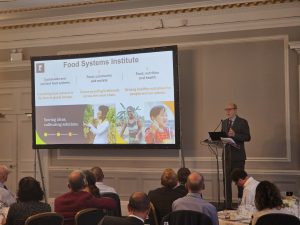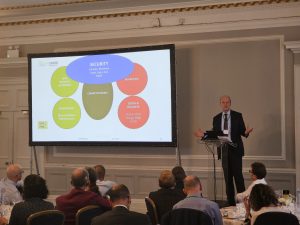United Kingdom
November 5, 2024

Jack Bobo
Internationally renowned expert on food systems Jack Bobo and Director General of Euroseeds, Garlich von Essen, were the two main speakers at this year’s annual gathering and AGM of the BSPB. A mix of members, other industry trade bodies, and policymakers heard both of them talk about different issues, but with a common theme – namely that the next few years are going to be some of the most crucial for agriculture, plant breeding, and the planet.
Once the short formalities of the AGM had been completed, BSPB chair Robin Wood gave a presentation on the work of the BSPB over the past year. It has been a challenging year for everyone due to many months of extremely wet weather, but policy changes had also exacerbated the issues facing the breeding sector. This was especially true in relation to the movement of seed – affecting both imports and exports, which has been a problem since Brexit but one which has worsened since the Border Target Operating Model (BTOM) came into force in April. The BTOM has added costs, delays and bureaucracy onto breeding work for some crops, and must be improved to prevent this further disadvantaging UK growers and breeders.
This is an issue largely within UK control, one where we have already asked Government to look at a mix of things which could help. This includes simplified processes for moving breeding material which is already highly monitored, reviewing risk categorisations for some crops, and allowing movement to point of delivery pending results rather than seed being held at the border which would all help. Robin went on to explain that there has been some welcome news, not least with the new Government announcing they will be proceeding with the necessary secondary legislation on precision breeding. We await the detail of this, but will continue to make the case for it to genuinely enable breeders to utilise the potential it has to reduce the time it takes to get newer and better varieties to growers. This related directly to the later discussion on the importance of innovation to enable agriculture and food systems more generally to address the many pressing policy challenges we are facing.
Robin finished by mentioning the global nature of plant breeding, and the importance of improving the EU-UK relationship which provided a nice segway for Garlich to take the stage.

Robin Wood, BSPB Chairman
Garlich Von Essen gave an excellent overview of the political situation facing the breeding sector and agriculture in the EU. This is a crucial topic to most BSPB members, many of whom are part of European wide organisations, or have breeding partnerships with companies based in the EU. Garlich summarized the vicissitudes of the EU’s proposed Green Deal which had prompted concern across the agricultural sector. Much of this stemmed from the estimated 15% drop in food production across the EU which the reductions in plant protection products, fertiliser, changed land use, and expansion of organics would likely lead to. Whilst the growing opposition to aspects of the Green Deal has seen many of the proposals dropped or postponed, he made clear the ideas haven’t gone away. Indeed, Garlich went on to explain that ideology continued to drive some in the EU to support the greater use of landrace and conservation seed, even though the future of increasingly sustainable agriculture will come from innovative new varieties.
Elections earlier this year have prompted changes in the European Parliament, with an increase of support for the right and centre-right parties. Although President Ursula von der Leyen remains in post, the Commission has also changed significantly, but as he made clear, it’s a little concerning candidates were hardly queueing up for the agriculture brief! Overall, Garlich presented a picture of a dilemma: plant breeding offers enormous potential to address the policy challenges the EU (and beyond) faces, but the policies being pursued have the potential to further stifle this, or at least not promote it. His final remarks were on the EU-UK relationship, and how Euroseeds is going to expand its work with the BSPB and others to support both sides trying to seek improvements in this area and ended on a note of optimism here.

Garlich Von Essen, Euroseeds
Jack Bobo then took to the stage and expanded the focus still further to look at the incredibly complex and global challenges facing agriculture and horticulture, and what can be done about them. Jack has a fascinating CV, having worked in the US State Department, and held a number of influential leadership and communications roles in fisheries and agriculture. He’s now Director of the University of Nottingham Food Systems Institute. His talk covered the climate and demographic challenges we face, and offered some thought provoking insights. He argued that our food system is not broken, as some claim, but good and getting better when compared to the past ‘just not fast enough’. He also looked at some of the potential trade-offs we face, not least the differing positions on local or globally focussed sustainability.
This was particularly interesting in light of Garlich’s explanation of the likely 15% reduction in food production the Green Deal would have caused. One of the most profound questions here was whether we should focus our efforts on the local, or on the global by encouraging everyone to think about which will make the greatest difference.
For example, the Green Deal might have made EU policy makers feel proud that they were being seen to be doing something ‘locally’ but is the planet any better off if that 15% reduction in food is instead imported from another highly biodiverse country, like for example, Brazil? Instead, is there a case for thinking about the global impact, and deciding it might be better to grow more ‘locally’ because the overall impact to the planet of doing so is less than importing it? A topical example for breeders could be with oilseed rape (OSR) – the UK clearly has the capacity to produce more OSR oilseed rape, and would doing so actually have less of a global impact than importing it?
This land sharing versus land sparing debate was something that many attendees continued to deliberate over lunch, such was Jack’s ability to get people thinking about so many issues facing the sector.
Jack finished by provoking further thought about the importance not just of policy, but how different perspectives and approaches to communications can help shape it. This became even more important when he outlined his view that the next 25 years are likely to be the most crucial there have ever been for agriculture, and by reminding us 2050 is only as far off as 2000! For plant breeders that 25-year timeframe becomes even more stark when breeding new varieties can take a decade or longer. This brings us full-circle to Robin’s remarks – the urgent need for policy improvements which remove some of the barriers, encourage innovative plant breeding and the use of precision breeding could hardly be more stark or urgent.